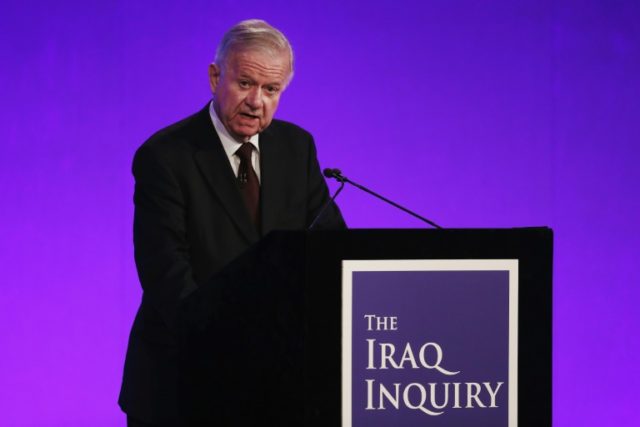London (AFP) – Former British prime minister Tony Blair on Wednesday made a passionate defence of the 2003 war in Iraq, after a long-awaited official inquiry condemned it as woefully executed and based on flawed evidence.
His voice cracking with emotion, Blair said he had “more sorrow, regret and apology than you may ever know or can believe” for some mistakes in the planning of the war and subsequent occupation.
But, in a two-hour press conference, he stuck resolutely to his defence, as more than 100 anti-war protesters gathered in central London to mark the report’s publication, many shouting: “Blair lied, thousands died” and “war criminal Tony Blair.”
“I believe we made the right decision and the world is better and safer” without Iraqi leader Saddam Hussein, Blair told reporters.
The Chilcot report offered a damning verdict on Britain’s role in the US-led war, detailing the flawed intelligence, questionable legal basis and “woefully inadequate” preparation for occupation.
Iraq’s descent into violence and loss of life following the invasion saw 150,000 Iraqis killed by the time British troops left in 2009.
The report said Britain deployed troops before diplomatic options had been exhausted.
It also highlighted how Blair wrote to president George W. Bush in July 2002, the year before the war saying: “I will be with you, whatever.”
The inquiry found that “military action in Iraq might have been necessary at some point. But in March 2003 there was no imminent threat from Saddam Hussein”.
– ‘No lies, parliament not misled’ –
The war was justified at the time by claims that Saddam had weapons of mass destruction, but they were never found and the intelligence was later withdrawn.
Chilcot laid the blame for this firmly on spy chiefs, clearing Blair’s officials of “improperly” influencing a key intelligence paper published in September 2002.
The report also criticised Blair for failing to challenge Bush on the lack of planning for the post-invasion phase — and dismissed his assertion that the impact of local militia and Iran could not have been predicted.
“I accept that especially in hindsight we should have approached the situation differently,” said the former Labour leader, who was prime minister from 1997 to 2007.
But he added: “There were no lies, parliament and cabinet were not misled, there was no secret commitment to war. The intelligence was not falsified and the decision was made in good faith.”
Iraq remains plagued by sectarian violence — on Sunday at least 250 people were killed by a Baghdad suicide bombing claimed by the Islamic State group.
Blair rejected claims the war led to the rise of Islamist groups in the region, saying Saddam Hussein was “himself a wellspring of terror” — but admitted many disagreed.
– ‘I hold him responsible’ –
Relatives of some of the 179 British soldiers who died in Iraq said they would scrutinise the findings for possible grounds for legal action against Blair and other officials.
“The inquiry has confirmed all our fears that these young men and women were deployed on the back of a falsehood,” said Roger Bacon, whose son Matthew, 34, died in 2005.
Rose Gentle, who lost her 19-year-old son Gordon, said the findings were “gut-wrenching”.
“I hold him responsible for the murder of my son,” she told reporters.
Britain’s scarring experience in Iraq has made it deeply wary of committing ground troops to international military interventions in countries like Syria and Libya.
Inquiry chairman John Chilcot said his report was “an account of an intervention which went badly wrong, with consequences to this day”.
The legality of the invasion was not in his remit, but the retired civil servant said the process of deciding the legal basis for war was “far from satisfactory”.
“We have concluded that the UK chose to join the invasion of Iraq before the peaceful options for disarmament had been exhausted. Military action at that time was not a last resort,” he said.
The inquiry was called under pressure from relatives, concerned about the justification for the war as well as poor military equipment, over which the Ministry of Defence was strongly criticised by Chilcot.
The families are not the only ones considering legal action against Blair — a cross-party group of MPs is also looking into the possibility, including of taking a case to the International Criminal Court.
The war, which at one point saw 46,000 British troops deployed, mostly in southern Iraq around the strategic oil hub of Basra, still looms large over British politics.
In a statement to the House of Commons, Prime Minister David Cameron said that all the MPs who backed it must “take our fair share of the responsibility”.
“We cannot turn the clock back but can ensure that lessons are learned and acted on,” he said.

COMMENTS
Please let us know if you're having issues with commenting.